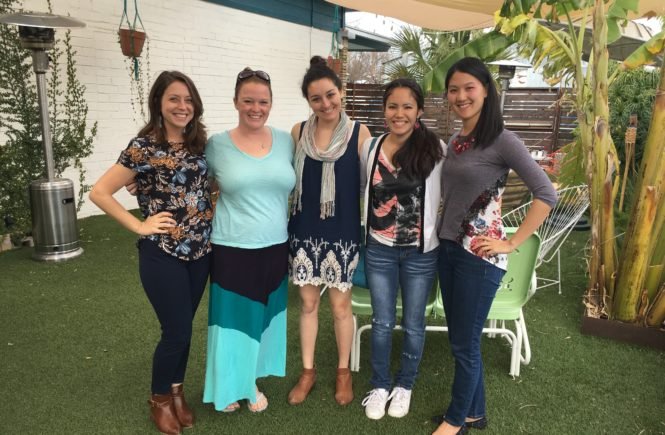The anxiety was crippling, to the point of nausea. I was trying to focus on my breathing– in for four seconds, out for four seconds. In through the nose, out through the mouth. Slow. It. Down. Hunched over, I stared at the worn, rusty brown fabric of the carpet in my office.
Ten months prior to this moment, in October 2017, I had started a new position at the University of Texas at Austin, where I currently work as an administrative professional. From 2011 to 2017 I worked at a department I loved, with colleagues that encouraged me, students that inspired me, and bosses that felt more like friends than managers. My job was my community, and it was more good than bad, but unfortunately I wasn’t being challenged or growing in this position.
So, last October, I started a new position at the University but in a different center. The change couldn’t have been more drastic. In my previous job, I wore two, maybe three hats– the job was manageable, with peak periods. At this job, every day was a peak period with critical, time-sensitive needs that had to be met. I felt like the tortoise, who in one moment upon accepting this position, was asked to be the hare.
But it wasn’t just my job that was causing me anxiety. It was also the awkward family dynamics every time my mom saw me and told me I needed to find a husband (me being unmarried and with no prospects, at 29, the horrors!). It was a prominent family leaving my church, which they had served and been members of for more than a decade. It was doubts I had about the goodness of God and His love for me. It was going from an Island of Misfit Toys with people like me, to being on an island alone. My community, in more ways than one, had dismantled around me and I was left holding the pieces.
Which is why I was counting to four, with my office door closed, staring at the floor. After the nausea stopped, I grabbed my phone.
New Message: Paige, Hanae*
“Hey ladies, do you have any tips or exercises you do when you’re feeling really anxious? It’s gotten to the point of spontaneous crying and feelings of nausea.”
These two women from church, whom I hadn’t talked to or seen in weeks, maybe months, were the anchors I threw overboard in an effort to reach solid ground. I received immediate responses and with it, immediate support. My island had two friends on either side of me, holding my hands, telling me it was going to be okay.
P: “Go for a run.” “Oh wait, don’t do that, it’s too hot. Do jumping jacks.”
“Have you ever done time clustering?”
H: “Breathe in for like 7 long seconds and exhale very slowly for 5 seconds. Do that
10 times.”
“Yoga! 5 minutes of intense stretching and intentional breathing helped me.”
“I repeat Philippians 4:6-7 and Psalms 37:3-4 over and over until some aspect of me believes it. Even if I don’t believe it in the moment, I still think the Word has the most power against lies or fear or whatever the Enemy is attacking with.”
P: “Also, beer. Use it as a last resort. But don’t tell anyone I said that.”**
H: “And when a lot of that fails, a very long hot shower or bubble bath.”
The responses ranged from helpful to hilarious. What is included here was only half of it. In the onslaught of gray text bubbles filling my screen I felt seen and understood. However, I wouldn’t have known to reach out to these two ladies unless they had first spoken up about their anxiety. I wouldn’t have known what to label what I was feeling unless these two women had not already given it a name.
God gave us the body for purposes such as this; they offered practical, tangible, immediate exercises that were no less powerful than a prayer. “Two are better than one, because they have a good return for their labor: If either of them falls down, one can help the other up. But pity anyone who falls and has no one to help them up.” (Ecc. 4:9-10). As women, we often give help to others, but it is just as critical to know how to ask and receive it.
God named us as ezer (helper). This verb means to help, support, and is used in scripture for a few reasons: for human’s rushing to each others aid (in military, Ezekial 30:8), and when God is doing the helping (1 Chronicles 2:18) [1]. Most notably, we as women interact with this verb when Eve is created for Adam as ezer-kenegdo (a helper suitable) because it was not good that he was alone. In all cases, when scripture uses this verb, ezer, it is used to show that without the helper, the person needing the help will either die or fade away [1].
Surely, without my friends offering help in that moment, I would have continued to experience intense levels of stress, emotional and spiritual lows, and alone-ness. When I felt crippled, I knew my anchors, my ezer — but only because they had told their story before. Those women stepped in as the body, to become my feet, when I felt unable to stand. This is a call to all women reading this:
1) Share your story, your struggle. Be vulnerable where you can and with whom you can.
2) Know your anchors and reach out when you find yourself on an island.
“So, in Christ we, though many, form one body, and each member belongs to all the other. For where two or three are gathered in my name, there am I with them.” -Romans 12:5, Matthew 18:20
[1] “Ezer Meaning.” Abarim-Publications, 2006. Web. 12 November 2018. http://www.abarim-publications.com/Meaning/Ezer.html#.W-mdr-JME2w.
*Names have been changed.
**This advice was given from my friend in good faith (with the permission to share her advice), knowing I do not struggle with alcohol consumption. Please do not use alcohol as a constant means of escape. Turn to your community, and get help if you need it. https://austinaa.org/





